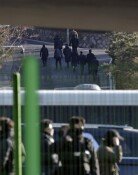Ozawa Ignites Internal Ruling Party Feud in Japan
Ozawa Ignites Internal Ruling Party Feud in Japan
Posted August. 27, 2010 13:04,
Japanese politics grew more unpredictable Thursday after Prime Minister Naoto Kan and Ichiro Ozawa, the former secretary-general of the ruling Democratic Party of Japan, declared a head-on struggle.
With their political lives at stake, their challenge could split the party and revamp the countrys politics.
○ Hard-to-predict power struggle
Ozawa is running in the election for party leader, making it harder to predict the result. The pro-Ozawa group consists of 150 lawmakers, more than a third of the partys tally of 412.
Former party leader Yukio Hatoyama, who leads the second-largest faction in the party with about 60 members, did an about-face to support Ozawa. Ozawa has apparently secured half of the partys legislators but many remain negative over his running because of his money scandals.
The faction led by Land and Transport Minister Seiji Maehara (40 members), that of Finance Minister Yoshihiko Noda (30), and that of Foreign Minister Kazuya Okada are on Kans side. Kan has about 50 supporters.
The confrontation between Kan and Ozawa is yet another battle between them, with the last coming in the election of April 2006, which Ozawa won. Ozawa was elected two times and once without a vote, beating Kan three times overall and earning the nickname election genius.
If Ozawa wins again, however, an abnormal situation is expected under which Japan will see its third prime minister in just a year after the party took power. Many legislators and people are negative over this prospect.
The Japanese public especially opposes the ruling partys focus on its internal power struggle at a time when Japan faces recession, financial instability, a shaky relationship with the U.S., and more opposition than ruling party lawmakers in the House of Councilors.
○ More confusion after election?
This election is all-or-nothing competition. In the past, the winner placed the loser in important positions in general elections but not this time.
Kan has bluntly rejected the possibility of reconciling with the pro-Ozawa group, making clear his opposition to his rival.
In response, Ozawa decided to run for election. Unlike when the party was the opposition, the fact that a party lawmaker is the prime minister heralds another type of struggle. So this is a fight over power as well as over the party.
The post-election picture is a source of worry because the loser will have no place to go. The party will also find it tough to integrate because of its split into pro- and anti-Ozawa factions. Kan denied the possibility of a split, but Ozawa is well experienced in splitting a party.
The Japanese political circle and media predicted after Kans declaration that domestic politics will see a major overhaul.
jkmas@donga.com







